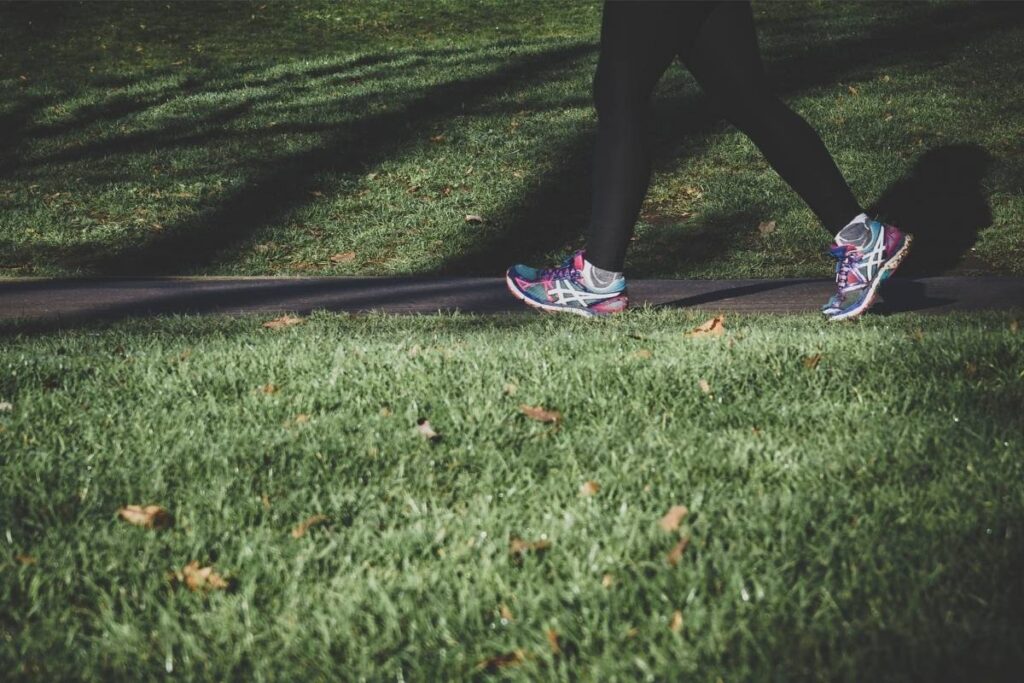Recovery for Runners: 5 Tips to Help You Rebuild After a Run
Whether you’re training for a long distance race, running casually, or just beginning your journey with this sport, recovery is crucial for all runners. Proper post-run recovery plays a big role in jumpstarting the muscle rebuilding process, preventing injuries, and also avoiding overtraining and burnout. So, if you’re lacking an effective and healthy post-run routine, keep reading so you can either add one to your training or enhance one you may already have. In turn, your recovery will help you not only feel better throughout your day, on your next run, and in your future training, but it will help you become a stronger runner overall.
Frequently Asked Questions – Recovery for Runners:
How can I recover faster from running?
In a nutshell, nourish your body and take care of it!
Recovery for runners begins during a training run and continues throughout the rest of the day and night. For example, if a runner has completed a speed workout, they should have at least 10 minutes of easy running (or a short walk after an easy run) to lower the heart rate, increase blood flow, and allow the body’s temperature to drop.
Next, the goal is to refuel and hydrate ideally within 30 minutes of finishing a run. Refueling with both carbohydrates and protein helps jumpstart the recovery process and repair damaged muscle fibers. Hydrating includes not only drinking water but replenishing electrolyte stores as well. It should also be noted that hydrating consistently throughout the day is important, not just after completing a run.
After the day is done, sleep becomes the main focus. Aim to get at least 7 hours of sleep every night, though 8 hours or more is ideal.
Finally, as a runner moves throughout their training week, they should have at least one complete rest day, which means no running, strength training or cross training.
How many rest days should a runner take?
This varies greatly from runner to runner. The number of rest days each week depends on running history, health, goals, and someone’s personal schedule. For example, if a person is just starting to run, it’s possible they might have three rest days a week. On the other hand, if a person has been running consistently for 2+ years, they might only have one rest day a week.
Is it okay to run everyday?
Ideally, no, a runner should not run everyday as running puts a lot of stress on the body. Rest days are critical for repairing muscle fibers and rebuilding. As a result, neglecting rest days can quickly lead a runner to an injury, overtraining, and physical and/or mental burnout.
Recovery for Runners – 5 Ways to Enhance Your Recovery Game:
1.) Cool down
We start recovering from our training when we’re still out running. If you’ve just completed a hard workout, make sure you’re getting at least 10 minutes of easy running in to cool down. Alternatively, if you’ve wrapped up an easy run, take a few minutes to walk. Cooling down helps lower heart rate, increase blood flow, and flush metabolic waste.
Not only do you want to cool down, make sure you’re including a proper warmup as well. Incorporate this Glute Activation Warm Up into your routine to activate your glutes and decrease your risk for injury.
2.) Refuel
While running, our muscle fibers become damaged and it’s up to us to repair them. Therefore, we need to actively do this by eating ideally within 30 minutes of finishing a run because our body is trying to recover. And this goes for ALL training runs, not just long runs and speed workouts. Our post-run meals should be made up mostly of carbohydrates with some protein. Keep these easy and quick post-run meals in mind to replenish energy stores and rebuild:
- Oatmeal with berries, banana, and nut butter
- Turkey sandwich with a side of fruit
- Avocado toast with eggs and fruit
- Yogurt with fruit and granola
If food sounds unappealing after a run, try drinking your recovery. Some ideas include:
- Chocolate milk
- Smoothie with milk, frozen berries, banana, and protein powder
3.) Hydrate
When a person runs (and therefore, sweats), they lose both water and electrolytes. Sweating is our bodies way to keep us cool when we’re working hard.
Don’t wait until you’re sweating or feeling thirsty to start drinking water! To stay hydrated throughout the day, carry a water bottle with you to hydrate consistently and often.
Additionally, hydrating means replenishing your electrolytes, especially after hard runs and during the warmer months. Easy ways to get in electrolytes after a run include using Nuun or drinking Gatorade.
One way to see if you’re hydrated is to check the color of your urine. A pale yellow urine means you are well hydrated. Dark yellow urine indicates a person is dehydrated and clear urine can signify over-hydration.
Hydrating is important year-round, especially during the summer months. Read here to learn more about summer training and how to stay hydrated.
4.) Sleep
Sleep is, by far, the most important and effective way to recover from your training. Aim for at least 7 hours of sleep a night. Bonus points if you can squeeze in a 20-minute nap!
On the other hand, runners who are not prioritizing their sleep have an increased risk for injuries, overtraining, and physical and/or mental burnout.
A few ways to improve your sleep include:
- Turning off electronics at least one hour before heading to bed.
- Limiting fluid intake as your bedtime approaches to lessen the chance of waking in the night.
- Avoiding caffeine after 12pm.
5.) Take rest days
When in doubt, remember this equation: stress + rest = growth.
Your training is only as good as your recovery. Rest days (no running, strength training, or cross training) significantly reduce your risk for injury, overtraining, and physical and/or mental burnout.
Additionally, rest days are not just crucial for our physical recovery, they’re key for our mental recovery as well. Just like having a weekend after a busy work week, incorporating a rest day into your training at least once a week helps us mentally recharge and get ready to tackle our next training session. If you do feel like getting some movement in on a rest day, go for a leisurely walk or practice some light yoga.
Keep in mind, no recovery tool will replace a good night’s sleep. However, if you are interested in a recovery tool, some ideas include:
- Foam Roller – Foam rolling increases blood flow and releases tightness.
- Sportneer Massage Gun – This massage gun targets deep tissues to relieve muscle soreness and tension.
- Epsom Salt – Epsom salt baths help increase blood flow.
Recap of Recovery for Runners:
Obviously, recovery plays a very important piece in our training. It’s true we may only be running for about 1 hour each day, but what we’re doing in the other 23 hours have a direct impact in how we repair, rebuild, and recharge. Here are five ways for runners to step up their recovery game:
- Cool down
- Refuel
- Hydrate
- Sleep
- Take rest days
5 Principles of Becoming a Stronger Runner:
- Build your mental toughness
- Focus on rest and recovery
- Train properly
- Fuel your running
- Strength train
Eager to become a faster and stronger runner? I would love to help you reach your running goals! Email me at [email protected] or check out my Run Coaching Services page to learn more.
Comment Below:
Do you have a post-run recovery routine? What does it look like?

















